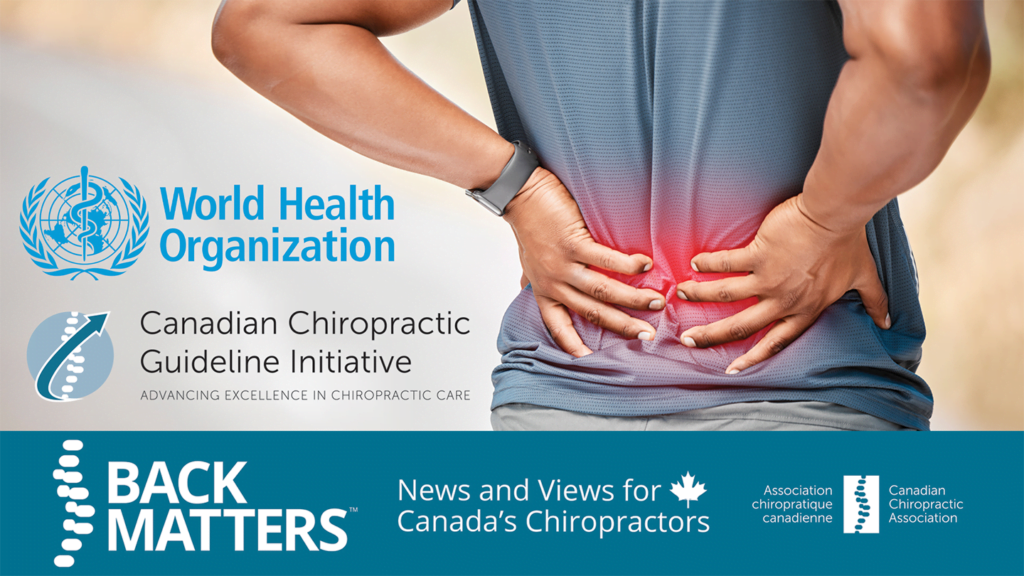Contributing to rehabilitation and low back pain research on a global level: CCGI and the WHO


Carol Cancelliere, DC, MPH, PhD
Low back pain and other musculoskeletal conditions are top contributors to disability worldwide. The CCGI has been involved in projects with the World Health Organization over the past few years, specifically in response to the WHO Rehabilitation 2030 call for action, which is committed to developing a Package of Interventions for Rehabilitation to support ministries of health in integrating rehabilitation services into health systems. Two sets of projects are highlighted here.
A recent study, “A systematic review of clinical practice guidelines for persons with non-specific low back pain with and without radiculopathy: identification of best evidence for rehabilitation to develop the WHO’s Package of Interventions for Rehabilitation” published in Archives of Physical Medicine and Rehabilitation (2023), was conducted to inform the WHO’s Package of Interventions for Rehabilitation (PIR) for low back pain (LBP). The identified interventions from the high-quality clinical practice guidelines (CPGs) were used as the basis for selecting relevant interventions included in the PIR for LBP. Our review summarizes recommendations from high-quality CPGs for the rehabilitation of adults with LBP with or without radiculopathy. Recommended interventions synthesized from this study included:
- education about recovery expectations, self-management strategies, and maintenance of usual activities;
- multimodal approaches incorporating education, exercise, and spinal manipulation;
- nonsteroidal anti-inflammatory drugs combined with education in the acute stage; and
- intensive interdisciplinary rehabilitation that includes exercise and cognitive/behavioural interventions for persistent pain.
Overall, the recommendations highlight the benefits of education, exercise, and multimodal care that includes manual therapies. However, the use of most passive modalities is not recommended. Implementation strategies are needed to implement the recommendations and evaluation of these strategies to see if there’s an improvement in patients’ outcomes and costs.
The WHO is developing a clinical practice guideline for the management of chronic primary low back pain in adults, including those aged 60 years and older.
The Guideline will provide evidence-based recommendations for non-surgical interventions for chronic primary LBP for adults, including older adults. The Guideline will address the key question:
“What are the benefits and harms of non-surgical interventions in the clinical management of community-dwelling adults, including older adults aged 60 years and over, with chronic primary low back pain (with or without leg pain) in primary or community care settings compared with placebo, no intervention, or usual care?”
The CCGI led one of the teams that supplied several evidence syntheses to inform this guideline, using rigorous methodology including Cochrane methods, and the Grading of Recommendations, Assessment, Development and Evaluation (GRADE) approach to grading the certainty of the evidence. Led by Dr. Carol Cancelliere (scientist at the Institute of Disability and Rehabilitation Research (IDRR) and Faculty of Health Sciences, Ontario Tech University; CCGI Project Lead), the work took place January through December 2022, and included a collaboration of an international group of 25 individuals, ranging from senior scientists to early career scientists to trainees. The entire group is thankful for this valuable opportunity to work collaboratively with the WHO in contributing to a global guideline targeted at multidisciplinary healthcare providers in primary and community care settings to hopefully improve outcomes for adults with chronic low back pain. The manuscripts are currently being prepared for publication.
Earlier this year, CCGI released a 1-1.5-hour course that aims to enhance your clinical decision-making for adults with low back pain by assessing the risk for serious pathology.
Take the evidence-based online module here!
By Carol Cancelliere, DC, MPH, PhD